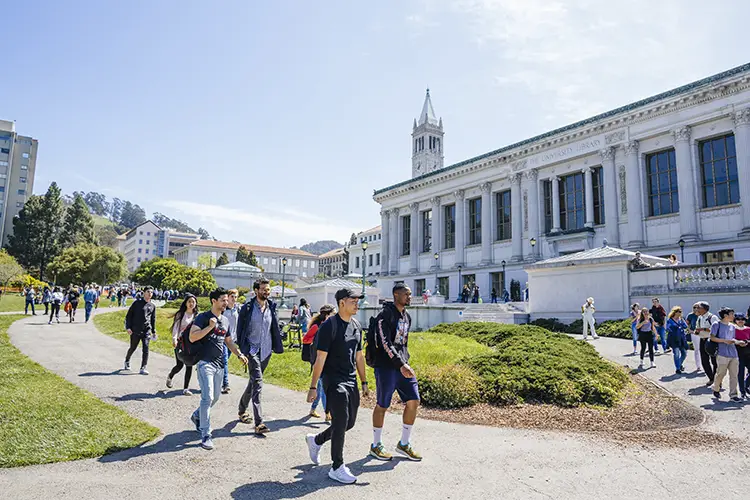While most college students will spend the course of their undergraduate career at their home university, a growing number of students are choosing to spend a semester studying abroad, an experience that can present students with new experiences and opportunities as well as challenges that they may not get exposure to by studying domestically.
According to data from the most recent annual Open Doors report, more than 340,000 students in total studied abroad during the 2017-2018 school year, representing a 2.7% increase from the previous year. That means 10.9% of all undergraduates and 16% of students enrolled in a baccalaureate program study abroad at some point during their college education.
Most colleges and universities have some kind of study abroad program available to students and there are also outside organizations such as the Institute for the International Education of Students or the International Student Exchange Program, nonprofits that facilitate study abroad programs and help students overcome barriers to studying abroad.
The ISEP, for example, gives students from member universities the opportunity to apply for study at one of the hundreds of other member schools, expanding their options for where they can study abroad when their home university’s study abroad program would otherwise be limited by the number of students interested in studying abroad, the number of partner universities, and the limits of that university’s staff.
“In a traditional exchange model, one student from Pennsylvania would go to a partner school in Germany, and one German student would go to Pennsylvania,” Melody Stratton, the director of strategic communications at the ISEP told The College Post. “With ISEP…I could apply to study at one of the hundreds of other member schools…The student from Pennsylvania can go to a member school in Japan, the Japanese student could go to a member school in Italy, and the Italian student can go to the member school in Pennsylvania.”
As students look for a study abroad program to apply for, there are a number of considerations involved. Programs vary in length and can range from a short trip that lasts just a few weeks over winter break to semester-long programs that last four or five months and even year-long programs. Students also have to consider where they want to study and how the curriculum of the program fits into their major and career goals.
A major obstacle to studying abroad for many students is the cost associated with doing so, but there are a number of opportunities available to mitigate those costs including scholarships and loans. Nonprofits like IEP and ISEP can also help students to deal with the financial challenge that comes with studying in another country. Different study abroad programs also come with different costs, so students can choose a program that fits within their budget and can sometimes even use their financial aid to offset the costs.
Despite the obstacles students have to overcome in order to study abroad, Stratton, as well as some students who have participated in study abroad programs, said there are major benefits to studying abroad if you’re able to overcome those challenges.
“Studying abroad makes you more culturally competent, teaches you independence, and prepares you for a career in a globalizing workforce,” Stratton said. “It helps you understand global problems from a non-U.S. perspective…Employers are looking for this kind of global perspective and competency, and value them as competitive advantages in the workplace.”
Valencia Alvarez is a fourth-year student at Grinnell College and studied abroad last year in Santiago, Chile through the IES program. Alvarez took classes at Santiago’s IES center on healthcare and medical terminology, participated in an internship program, worked with an immigration organization, and played soccer with Chilean students on the university soccer team. Alvarez said the IES made the transition to Chile a lot easier, enabling students to “focus on learning” and become immersed in the culture.
“I think the biggest thing I got out of studying abroad was my development and my sense of international citizenship,” Alvarez told The College Post. “I learned a lot about my interests and my passions outside of the context of the United States, and I was really able to connect to people on a different level in a language that I wasn’t used to speaking here in the United States.”
In order to cover the cost of her trip, Alvarez said she was able to get a stipend from Grinnell College and also applied for a scholarship from the state of Iowa. Alvarez said studying abroad is financially possible and that there are a lot of financial resources available to students finance studying abroad.
Jeshurun E Adarquah-Yiadom is another student from Spelman College who has participated in two study abroad programs during her academic career in Ecuador and South Africa. Adarquah-Yiadom hopes to be an international emergency doctor and will be graduating from Spellman this May. She described her study abroad experience as a “unique form of instantaneous growth.”
“[The experience of studying abroad] is something that can be leveraged in any and all aspects of life,” Adarquah-Yiadom said. “It can be leveraged personally. It can be leveraged in relationships and career opportunities, so I always encourage that growth. I always try to do my best to encourage students to go regardless of financial reasons or preconceived notions or whatever.”
Adarquah-Yiadom said she financed her studies abroad with loans that she had already taken out for college, assistance that she received from IES’s program, and a few scholarships that she applied for. Adarquah-Yiadom said she chose to study with IES because she had known of their reputation for fostering study abroad experiences for students with financial limitations.
China Issues Warnings to Students Studying Abroad at U.S. Institutions



